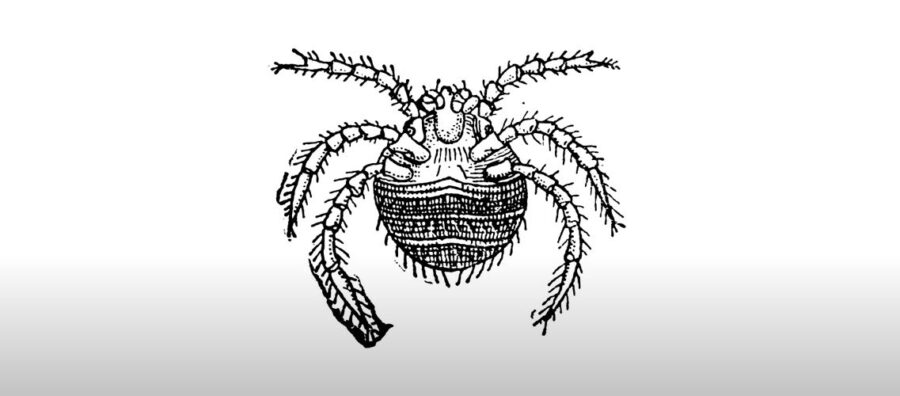Are you being tormented by intense itching in your bed? Are these bites small, red and blistering? If so, they could actually be chigger bites and not bed bugs or fleas.
Do you want to know how to treat chiggers in bed sheets?
What should you wash your bed linens with when you suspect that there are chiggers? How long will chiggers survive in your bed?
In this article, we’ll cover everything there is know about treating chiggers in bed sheets.
How to Treat Chiggers in Bed Sheets
A laundry cycle with hot water and detergent will be enough to kill chiggers that may still be alive in your bed sheets. Chigger larvae need a host or will die within a couple of days.
Bleach, rubbing alcohol, essential oils, sulfur powder, steaming or soap and hot water will treat chiggers and get rid of them from your bed.

Do Chiggers Stay On Bed Sheets?
It’s going to be hard for chiggers to stay alive on your bed sheets without a warm body as a host. The chigger larvae need to feast off of skin cells so they can fall off their host and grow two extra legs to become a nymph and later turn into adults.
If your bed is unoccupied and the bed sheets aren’t being used, chiggers will not be able to survive more than a day or two. Chiggers are not accustomed to living in indoor environments. They may have arrived on your clothes or hitched a ride on your skin or with a pet in the home.
Chiggers don’t wish to stay on bed sheets. They will crawl and try to find their way out because they prefer moist environments and preferably dwell on soil or dense vegetation.
Do I Need to Wash my Sheets If I Have Chiggers?
You should always wash your sheets if you suspect that any pest has made contact with it. Chiggers are not the usual culprit to be lingering in your bed. They do not survive in indoor environments.
Chiggers need a host to feed off their skin. Chiggers will try to remain with the host, but since they do not burrow into the skin, they are easily able to fall off. This is why you may have chiggers in your bed sheets.
If you suspect that chiggers are in your bed sheets, a simple wash cycle with regular detergent and hot water will do the trick. There is no chance for chiggers to survive hot water.
They also prefer a moist environment because dry air or direct sunlight will dehydrate them. A cycle in the dryer will also kill chiggers.
How Long Do Chiggers Live on Blankets?
The longest amount of time that a chigger will remain on blankets would be about 3 days. The only way that chiggers would survive is if you were continuously sleeping in this bed and using these blankets while they were feeding on your skin.
Without a host, chiggers cannot live on blankets for longer than a day or two. Chiggers who feed off of our skin are in their larval stage. They need to latch on to a host in order to inject digestive enzymes on the skin of a warm body in order to ingest it.
A chigger cannot survive on a blanket without a host and will be unable to complete its life cycle. Most likely, the chigger will die within the day and you might see a nearly microscopic red bug lying dead on your blanket.

Can Chiggers Live In Your Bed?
Chiggers cannot live in your bed for very long. They have arrived in their larvae stage because this is the time that they need to feed off of our skin.
Once this stage is complete, they will move on to becoming a nymph, and soon an adult. During these two stages they do not seek out a host to bite.
They would prefer to feed off of the soil and moist outdoor environments where there is plenty of decayed plant matter and dead insects for their next meal.
Four Ways to Stop Chiggers From Entering Your Bed
The following four tips are helpful for anyone who is having an issue with chiggers biting them while they are sleeping in their bed.
They could be hiding in your bed sheets or on your blanket. Follow these four tips and you will be free of chiggers from now on:
- Do not put your outdoor clothes on your bed. Chiggers may have been attached to your clothes and crawled inside your bed.
- Stop allowing your pets to lie on your bed. It is easy for chiggers to hitch a ride on a dog or cat and enter your home this way.
- Wash your sheets and bedding often with the hottest setting in your washing machine to kill any chiggers.
- Keep your bed as dry as possible. Dehumidify the bedroom.
If your bed is moist, warm and a little damp, it would be the perfect grounds for females to lay more eggs in your bed that could produce further chigger larvae that love to bite our skin.
Can You See Chiggers In A Bed?
It will be hard to see chiggers in your bed because they are nearly microscopic. You are looking for bright orange or red little mites that are crawling and looking for a shady, moist area and a warm body to bite.
Here are some ways you can try to find chiggers in your bed:
- Get a black piece of paper and a magnifying glass.
- Hold the paper at an angle and see if you can attract a chigger to crawl onto it.
- If you see a small red dot moving on the black paper, look at it closer with a magnifying glass.
- If you have identified that you have a chigger in your bed, it’s time to wash all your bedding with hot water and soap to get rid of them.

How Do I Get Chiggers Out of My Bed Sheets?
Chiggers can survive in bed sheets that are moist and damp. Imagine bed sheets that have been not been dried well or liquid has been spilled on it.
This would provide a great location for a female mite to lay up to 15 eggs in one day which will hatch into chiggers.
The chigger larvae will not survive very long without finding a host to feed on. During this stage in their life, they need to inject digestive enzymes into their host to create liquefied skin cells in order to ingest them.
If you suspect that your bed sheets are soiled, wet, damp or moist and you may have already felt the bite that creates an intense itching sensation, it’s time to pull out all the bedding and wash them thoroughly in the washing machine with hot water and soap.
Will Chiggers Always Bite You If They Are In Your Bed?
Chiggers are mites in their larval stage. This is when they do bite, and yes, they will bite you in your bed.
If your canine companion or feline friend has brought chiggers into your home and jumped onto your bed, this is going to be a spot where they will wait for the right moment when you decide to crawl into your own bed for the night.
A chigger will not survive long enough for a host who is not going to enter the bed for another day or two.
If a chigger made it into your bed in the afternoon and you did not notice them by the evening, you will most likely have chigger bites when you wake up in the middle of the night with intense itching.
How Do I Know if a Chigger Bit Me in My Bed?
Look for the following signs if you suspect that the bite on your skin is actually caused by chiggers and not fleas or bed bugs.
The most common symptom is intense itching.
- Look for red blisters in clusters.
- These bites can also look like pimples.
- The bites do not spread to other parts of your body.
- A bite from a chigger may last up to two weeks.

What Should I Do if There Are Chiggers in My Bed?
Follow the steps below to make sure that your bed sheets, blankets and overall bedroom environment is free of chiggers:
- Wash all the bed sheets, blankets, pillows and linens with detergent and hot water.
- Use the hottest setting in the dryer to dry out any insects.
- Vacuum your bedroom thoroughly, especially any carpets near the bed.
- Use a steam cleaner on your bed sheets and carpet.
- Apply a disinfectant that is either natural essential oils or a safe commercial disinfectant intended for indoor use.
- Look to use pesticides with the ingredients, bifenthrin and cyfluthrin.
- Sprinkle sulfur powder to repel chiggers, but keep in mind that it will smell like rotten eggs.
How to Keep Chiggers From Entering Your Bedroom
The next time you come in from the outdoor camping trips or trekking in the forest or even a day out in the park or your backyard, you need to keep in mind that you may in fact be bringing in pests like chiggers into your home.
- Cover up when you are outside.
- Do not leave their skin visible.
- Keep your grass short on your property.
- Pretreat your outdoor clothes with insect repellent before you put it on.
- Apply pesticides to your yard, especially during warm months.
- Thoroughly check your pets for any mites, chiggers or ticks that would like to remain on their fur or skin.
Thanks for visiting ThePestManagement.com for the best information to help you to make the pest control process easy, safe & affordable.
